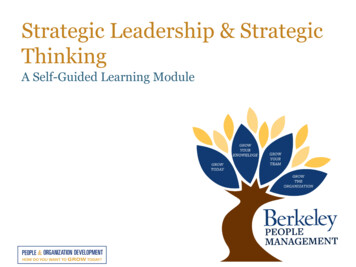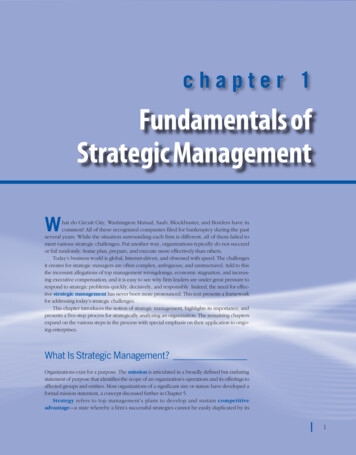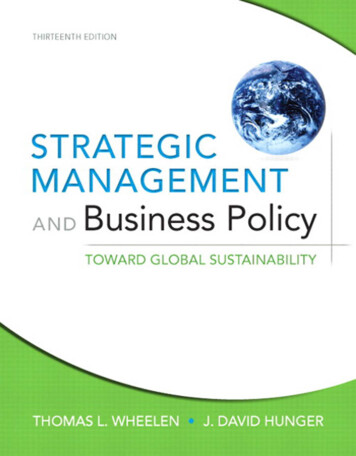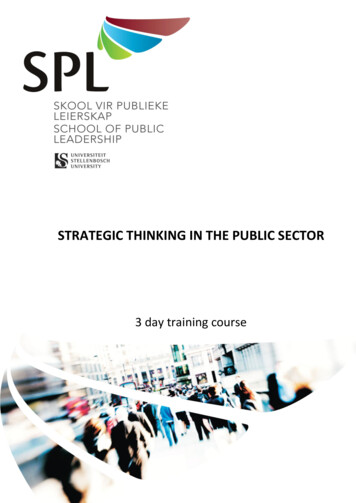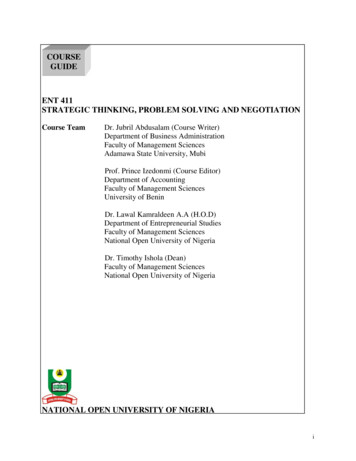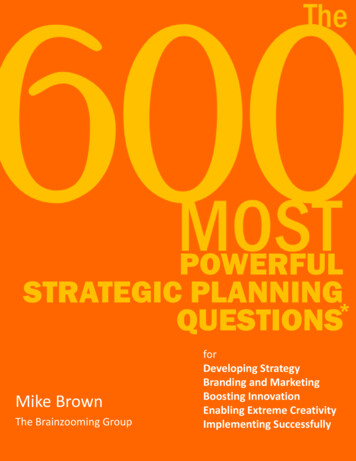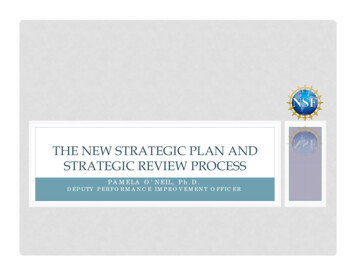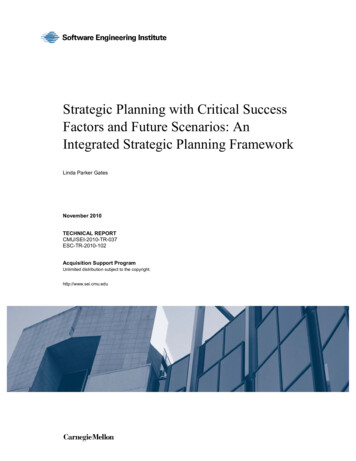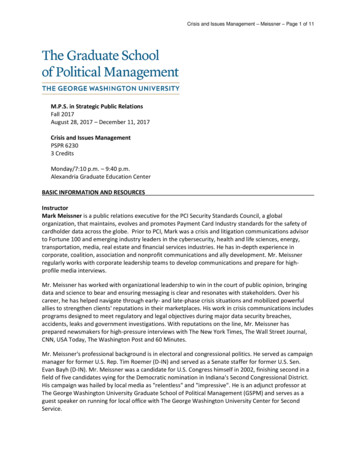
Transcription
Crisis and Issues Management – Meissner – Page 1 of 11M.P.S. in Strategic Public RelationsFall 2017August 28, 2017 – December 11, 2017Crisis and Issues ManagementPSPR 62303 CreditsMonday/7:10 p.m. – 9:40 p.m.Alexandria Graduate Education CenterBASIC INFORMATION AND RESOURCESInstructorMark Meissner is a public relations executive for the PCI Security Standards Council, a globalorganization, that maintains, evolves and promotes Payment Card Industry standards for the safety ofcardholder data across the globe. Prior to PCI, Mark was a crisis and litigation communications advisorto Fortune 100 and emerging industry leaders in the cybersecurity, health and life sciences, energy,transportation, media, real estate and financial services industries. He has in-depth experience incorporate, coalition, association and nonprofit communications and ally development. Mr. Meissnerregularly works with corporate leadership teams to develop communications and prepare for highprofile media interviews.Mr. Meissner has worked with organizational leadership to win in the court of public opinion, bringingdata and science to bear and ensuring messaging is clear and resonates with stakeholders. Over hiscareer, he has helped navigate through early- and late-phase crisis situations and mobilized powerfulallies to strengthen clients' reputations in their marketplaces. His work in crisis communications includesprograms designed to meet regulatory and legal objectives during major data security breaches,accidents, leaks and government investigations. With reputations on the line, Mr. Meissner hasprepared newsmakers for high-pressure interviews with The New York Times, The Wall Street Journal,CNN, USA Today, The Washington Post and 60 Minutes.Mr. Meissner's professional background is in electoral and congressional politics. He served as campaignmanager for former U.S. Rep. Tim Roemer (D-IN) and served as a Senate staffer for former U.S. Sen.Evan Bayh (D-IN). Mr. Meissner was a candidate for U.S. Congress himself in 2002, finishing second in afield of five candidates vying for the Democratic nomination in Indiana's Second Congressional District.His campaign was hailed by local media as "relentless" and "impressive". He is an adjunct professor atThe George Washington University Graduate School of Political Management (GSPM) and serves as aguest speaker on running for local office with The George Washington University Center for SecondService.
Crisis and Issues Management – Meissner – Page 2 of 11Contact InformationPhone Number: (202) 744-8557Email Address: markmeissner1@gmail.comCommunicationEmail or text is the best way to reach me. I am available throughout the semester for scheduled callsand office hours by request. Please do not hesitate to reach out to me for questions and guidance.Blackboard SiteA Blackboard course site has been set up for this course. Each student is expected to check the sitethroughout the semester. Students can access the course site at https://blackboard.gwu.edu. Supportfor Blackboard is available at 202-994-4948 or helpdesk.gwu.edu.Academic IntegrityAll members of the university community are expected to exhibit honesty and competence in theiracademic work. Students have a special responsibility to acquaint themselves with, and make use of, allproper procedures for doing research, writing papers, and taking exams. Members of the communitywill be presumed to be familiar with the proper academic procedures and will be held responsible forapplying them. Deliberate failure to act in accordance with such procedures will be consideredacademic dishonesty. Academic dishonesty is defined as “cheating of any kind, includingmisrepresenting one’s own work, taking credit for the work of others without crediting them andwithout appropriate authorization, and the fabrication of information.” Acts of academic dishonesty area legal, moral, and intellectual offense against the community and will be prosecuted through theproper university channels. The University Code of Academic Integrity can be found egrity.Support for Students with DisabilitiesGW’s Disability Support Services (DSS) provides and coordinates accommodations and other services forstudents with a wide variety of disabilities, as well as those temporarily disabled by injury or illness.Accommodations are available through DSS to facilitate academic access for students with disabilities.Please notify your instructor if you require accommodations. Additional information is available athttps://disabilitysupport.gwu.edu/.In the Event of an Emergency or Crisis during ClassIf we experience some an emergency during class time, we will try to stay at this location until we hearthat we can move about safely. If we have to leave here, we will meet at Carlyle Square in order toaccount for everyone and to make certain that everyone is safe. Please refer to Campus Advisories forthe latest information on the University’s operating status: http://www.campusadvisories.gwu.edu/.Attendance PolicyClass attendance and participation is imperative to your success in this class. As crisis work focuses onhigh-speed decision-making, your participation in class is invaluable to your coursework and learning.While attendance will not be kept, class participation will be a significant part of your final grade. If youmust miss class, please make prior arrangements with me.
Crisis and Issues Management – Meissner – Page 3 of 11Out-of-Class/ Independent Learning ExpectationOver the course of the semester, students will spend at least 2 hours (100 minutes) per week in class.Required reading for the class meetings and written response papers or projects are expected to takeup, on average, 7 hours (350 minutes) per week. Over the course of the semester, students will spend25 hours in instructional time and 87.5 hours preparing for class.Course EvaluationAt the end of the semester, students will be given the opportunity to evaluate the course through GW’sonline course evaluation system. It is very important that you take the time to complete an evaluation.Students are also encouraged to provide feedback throughout the course of the semester by contactingany/all of the following:Professor Lawrence ParnellDirector, Strategic Public Relations Programlparnell@gwu.edu 703-29- 4150Dr. Jack ProstkoAssociate Dean for Learning and Faculty DevelopmentCollege of Professional Studiesjackp@gwu.edu 202-994-3592Suzanne FarrandDirector of Academic Administration, GSPMsfarrand@gwu.edu 202-994-9309
Crisis and Issues Management – Meissner – Page 4 of 11THE COURSEStrategic Public Relations Program ObjectivesUpon the completion of the Masters in SPR, students will have obtained an enhanced understandingand skills in:1. Fundamentals of effective, strategic communications;2. Best practices for writing, media relations and strategic communications planning andimplementation;3. The fundamentals of tactical execution of a strategic communications plan;4. Working with management and staff/vendors to develop and manage the implementation ofeffective communications strategies.Course Description and OverviewThe practice of Issues Management involves the intersection of a number of communications and policydisciplines, including environmental scanning, public policy analysis, public policy advocacy, strategiccommunications, media relations, grassroots mobilization, coalition management and corporatereputation management. This course will explore all the approaches in detail and examine ways in whichthey work together to further the broad strategic goals of organizations.The goal of the course is to provide students with an in-depth knowledge of the various elements ofIssues Management and to equip them with the practical skills needed to shape public opinion andpublic policy in order to advance organizational goals.Course Learning Objectives1. Understand the procedures and techniques involved in the issues management process, includingthe dynamics of a strategic response.2. Understand the crisis and issues management life cycle. Be able to assess the scale and trajectory ofa crisis situation and offer public relations-related counsel.3. Develop the ability to conduct traditional and social media scans to sense and identify potentialissues, and develop plans to navigate challenging public relations environments.4. Learn to think strategically when confronted by limited information and time constraints related tocrisis situations.5. Develop a crisis/issue communications plan.Course RequirementsStudents are strongly encouraged to attend and participate in class. Participation in group work andclass discussions is imperative to understanding the crisis and issues management framework. Studentswill be asked to participate in group assignments as well as work independently on a comprehensivestrategic communications plan on behalf of a client of your choosing. Be prepared to invest significanttime and effort in the development of your communications plan.Evaluation and GradingAssignmentLearning Objective(s) AddressedDue DateWeightIssue Identification Identify yourcrisis/high stakes issue and1, 2, 3, 49/155%
Crisis and Issues Management – Meissner – Page 5 of 11illustrate in one page why andfor whom it is a crisis/issue.Client Selection - What client inthe crisis/high stakes situationwill you work for throughout thesemester? In one page identifythe client, provide backgroundinformation on the individual ororganization and illustrate whythis client should care about theissue at hand.Crisis/Issue Case Study Preparea report that fully articulates thesensitivities and issues related toyour selected issue and client.Identify the stakeholdersinternal and external, providehistorical context on the issue asit relates to the public and theclient.1, 2, 3, 49/2210%1, 2, 3, 4, 510/20-2715%Crisis/High Stakes PlanClass Participation50%Class simulations and participation indiscussions.Total20%100%Following is the grade scale for all GSPM classes:Grade*A94-100AB 90-9387-89B83-86B-80-82C 77-79Grading StandardYour work is outstanding and ready for submission in a professionalenvironment. Your material, effort, research, and writing demonstratesuperior work.Represents solid work with minor errors. Overall, excellent work.Very good. Represents well-written material, research, and presentation,but needs some minor work.Satisfactory work, but needs reworking and more effort. Note thatalthough not a failing grade, at the graduate level, anything below a “B”is viewed as unacceptable.You’ve completed the assignment, but you are not meeting all of therequirements.Needs improvement in content and in effort. Shows some motivationand concern.
Crisis and Issues Management – Meissner – Page 6 of 11C73-76C-70-72 (lowestgrade to pass)Below 70FNeeds reworking, improved effort, and additional research. Showsminimal motivation and concern.Poor performance. Major errors, too many misspellings, problems withaccuracy, etc.Unacceptable performance, or inability to submit the assignment.*Please note that you may be penalized for late submission of assignment(s).Required Text and Learning MaterialsMedia Relations Handbook, Fitch and HoltzISBN: ficials/dp/1587331675/ref sr 1 1?ie UTF8&qid 1503248013&sr 81&keywords Media Relations HandbookThe Four Stages of Highly Effective Crisis Management, Jordan-MeierISBN: ective-CrisisManagement/dp/1439853738/ref sr 1 1?ie UTF8&qid 1503248573&sr 81&keywords Four Stages of Highly Effective Crisis ManagementSocial Media and Crisis Communications, Austin & JinISBN: sis-Communication-LucindaAustin/dp/1138812005/ref sr 1 1?ie UTF8&qid 1503248628&sr 81&keywords Social Media and Crisis CommunicationsHarvard Business Review on Crisis ManagementISBN: ess-Review-CrisisManagement/dp/1578512352/ref sr 1 1?ie UTF8&qid 1503248662&sr 81&keywords Harvard Business Review on Crisis ManagementAdditional readings may be distributed in classTentative Course Calendar**The instructor reserves the right to alter course content and/or adjust the pace to accommodate classprogress. Students are responsible for keeping up with all adjustments to the course calendar.August 28, 2017Week 1Topic and Content Covered: An introduction to crisis and issues management from a public relations andengagement perspective. Course outline, guest speakers, syllabus and course work will be discussed.
Crisis and Issues Management – Meissner – Page 7 of 11Class assignments and final projects discussed/explained. Each student will be asked to introducethemselves and talk about their learning goals for the semester.Learning Objective(s) Addressed: 1, 2, 3, 4, 5Reading Assignment:Media Relations Handbook: Ch. 12 p. 232-264Four Stages: Ch 1-4 pp. 123HBR on Crisis Management, Ch. 4 – Right Away and All at OnceHBR on Crisis Management, Ch. 7 – Leadership When There is No One to AskAssignment:Draft personal biography/goalsIdentify issue/client for your communications planSeptember 4, 2017Week 2Labor Day – No Class – Enjoy the end of summer and the start of college football! Go Irish!September 11, 2017Week 2Topic and Content Covered: Identifying the nature of a crisis. Discussion of real-time examples ofchallenging issues and crisis including audience identification, landscape and threat analysis.Learning Objective(s) Addressed: 1, 2, 4Reading Assignment Today:Assignment:The Four Stages Section V pp. 183-201Issue Identification Assignment – identify the crisis/high stakes issue you willbe designing your communications plan around.September 18, 2017Week 3Topic and Content Covered: The anatomy of an issue or crisis and the corresponding issue managementor crisis response campaign.Learning Objective(s) Addressed: 1, 2, 4Reading Assignment:Four Stages Section II pp 47-80
Crisis and Issues Management – Meissner – Page 8 of 11Assignment: Select your client for whom you will be writing your crisis/high stakes communicationsplan for.Assignment(s) Due Today:Issue Identification assignment - Identify your crisis/high stakes issue and illustrate in one page why andfor whom it is a crisis/issue.September 25, 2017Week 4Topic and Content Covered: Communications considerations in challenging times. The elements of agood crisis/high stakes communications plan? What is the strategy? Who is the crisis/high stakes team?Who is the audience, who are the communicators, and what do they need to hear and share?Learning Objective(s) Addressed: 1, 4, 5Reading Assignment:Media Relations Handbook Ch 1 pp. 3-19Four Stages Section III pp. 85-116HBR on Crisis Management, Ch. 1Assignment:Write the client strategy for your crisis/high stakes communications planIdentify the various audiences you will need to communicate with in yourplan.Assignment(s) Due Today:Client Selection - What client in the aforementioned crisis/high stakes environment will you work forthroughout the semester? In one page identify the client, provide background information on theindividual or organization and illustrate why this client should care about the issue at hand.October 2, 2017Week 5Topic and Content Covered: Messaging plan for your crisis/high stakes situation. What will be yourmessage and what avenues will you use to get your messaging out to various stakeholders? How andwhat will you communicate to various stakeholders?Guest Speaker: Mike McCurry, Former White House Communications DirectorLearning Objective(s) Addressed: 3, 4, 5Reading Assignment:Four Stages Section IV pp. 121-141Media Relations Handbook Ch 3. Pp 49-63Social Media and Crisis pp. 99-112
Crisis and Issues Management – Meissner – Page 9 of 11Assignment: Draft the messaging for your client plan. This should include a core message/talkingpoints, Qs & As, spokesperson identification and training plan, holding statements, and social mediacontent.October 9, 2017 – Fall Break – Enjoy!October 16, 2017Week 6Topic and Content Covered: Social Media during a crisis/high stakes event.Learning Objective(s) Addressed: 1, 2, 3, 4, 5Guest Speaker: Andy Oare, Vice President, Glover Park GroupReading Assignment:Social Media and Crisis pp. 127-180.Media Relations Handbook pp. 119-155Four Stages pp. 203-235Assignment: Draft the social media plan for your crisis/high stakes plan.October 23, 2017Week 7Topic and Content Covered: Media relations in a crisis/high stakes environment.Learning Objective(s) Addressed: 1, 2, 3, 4, 5Reading Assignment: Media Relations Handbook pp. 21-45. pp. 67-88 p. 281Assignment: Draft the media relations plan for your client project. Include a media relations strategicplan, media protocol, priority journalist spreadsheet, media training guide and tactical action plan.October 30, 2017Week 8Topic and Content Covered: Case Studies in Issue and Crisis Management (Student Projects)Learning Objective(s) Addressed: 1, 2, 3, 4, 5Reading Assignment: n/a
Crisis and Issues Management – Meissner – Page 10 of 11Assignment(s) Due Today: Crisis/Issue Case Study - Prepare a report that fully articulates the sensitivitiesand issues related to your selected issue and client. Identify the stakeholders internal and external,provide historical context on the issue as it relates to the public and the client.November 6, 2017Week 9Topic and Content Covered: Media Tools and TacticsLearning Objective(s) Addressed: 1, 2, 3, 4, 5Reading Assignment:Assignment:Media Relations Handbook 91-115. pp. 171-183Draft media tactics content for your client plan.November 13, 2017Week 10Topic and Content Covered: The politics of a crisis/high stakes event – the boss, lawyers, activists,lobbyists, congressional investigations, media bias towards your client.Learning Objective(s) Addressed: 1, 2, 3, 4, 5Reading Assignment:Media Relations Handbook pp. 159-168. pp 187-200.Assignment:Identify and address the political landscape of your client plan.November 20, 2017Week 11Topic and Content Covered: Third Party Allies and VendorsLearning Objective(s) Addressed: 1, 2, 3, 4, 5Reading Assignment:TBDAssignment: Develop a plan and budget for third-party ally identification and engagement and thirdparty vendor engagement.November 27, 2017Week 12Topic and Content Covered: Ethics in crisis/high stakes communications: In the eye of the beholderLearning Objective(s) Addressed: 1, 2, 3, 4, 5
Crisis and Issues Management – Meissner – Page 11 of 11Reading Assignment:Media Relations Handbook pp. 265-279Assignment:What are the ethical challenges to your client plan? What are your personalethical boundaries?December 4, 2017Week 13Topic and Content Covered: Open Forum on crisis and issue management. Question and answer sessionrelated to final projects/presentationsLearning Objective(s) Addressed: 1, 2, 3, 4, 5December 11, 2017Week 14Topic and Content Covered: Final PresentationsLearning Objective(s) Addressed: 5Assignment(s) Due Today: Final ProjectsCopyright StatementUnless explicitly allowed by the instructor, course materials, class discussions, and examinations arecreated for and expected to be used by class participants only. The recording and rebroadcasting of suchmaterial, by any means, is forbidden.
Crisis and Issues Management - Meissner - Page 1 of 11 M.P.S. in Strategic Public Relations Fall 2017 August 28, 2017 - December 11, 2017 Crisis and Issues Management . https://disabilitysupport.gwu.edu/. In the Event of an Emergency or Crisis during Class If we experience some an emergency during class time, we will try to stay at this .

